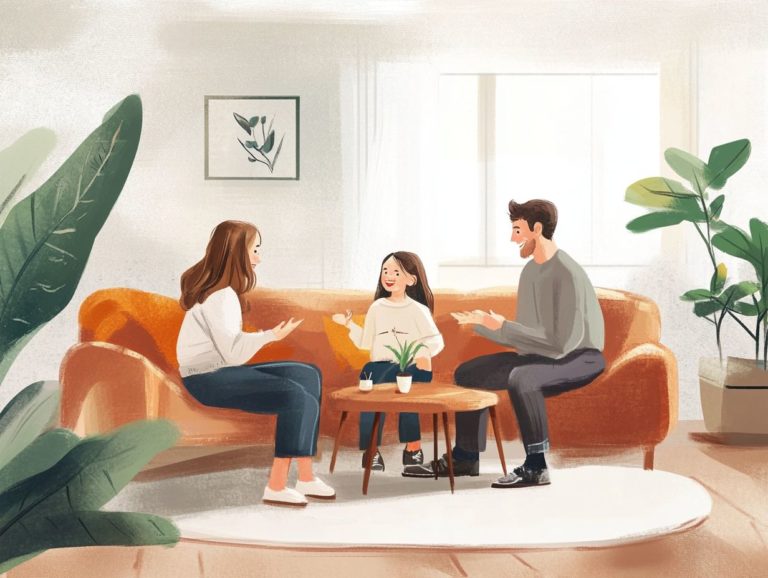The Importance of Validation in Conversations
Validation in conversations serves as a powerful tool that cultivates trust, understanding, and open communication. When you validate others, you acknowledge their feelings and perspectives, which enhances your connections and helps to minimize misunderstandings and conflicts, fostering emotional intelligence.
This article delves into the importance of validation, offering practical techniques for incorporating it into your conversations, and exploring the various types of validation and validation strategies that can foster more meaningful interactions.
Discover how you can elevate your communication skills, develop emotional validation skills, and nurture deeper relationships.
Contents
- Key Takeaways:
- Why is Validation Important in Conversations?
- 1. Builds Trust and Connection
- 2. Helps to Understand and Empathize
- How to Validate Someone in a Conversation?
- 1. Listen Actively
- 3. Encourages Open Communication
- 4. Reduces Conflict and Misunderstandings
- 2. Repeat and Reflect Their Feelings
- 3. Acknowledge Their Perspective
- 4. Avoid Judging or Criticizing
- What are the Different Types of Validation?
- 1. Acknowledging Feelings
- 2. Cognitive Validation
- 3. Behavioral Validation
- How to Practice Validation in Everyday Conversations
- Frequently Asked Questions
- Why is validation a game changer in conversations?
- How does validation contribute to effective communication?
- What are the benefits of validating someone’s feelings?
- Is validation necessary in all types of conversations?
- How can one validate someone’s experiences and emotions in a conversation?
- What happens when validation is absent in conversations?
Key Takeaways:

- Validation builds trust and connection in conversations, promoting emotional acceptance and mutual respect.
- Active listening, reflecting feelings, and acknowledging perspectives are key ways to validate someone.
- There are different types of validation, including emotional, cognitive, and behavioral, all of which are essential validation skills.
Why is Validation Important in Conversations?
Validation is essential in conversations, as it cultivates emotional connection and understanding between individuals. When you practice emotional validation, you show mutual respect and recognize the feelings of others, creating a safe space for open dialogue and self-validation.
This process not only enriches your relationships but also boosts emotional awareness, allowing you to express your feelings without the fear of judgment, thereby supporting mental health.
By incorporating validation language into your interactions, you can alleviate emotional distress and enhance your communication skills, ultimately nurturing your mental health and fostering psychological growth. This approach also supports your managing emotions and personal identity.
1. Builds Trust and Connection
Building trust and connection through emotional validation is crucial for cultivating healthy relationships. It allows you to feel seen and heard in your emotional experiences, reinforcing your self-worth and personal identity.
When you acknowledge another person s feelings with empathy, you create a safe space for vulnerability. For instance, if someone shares their sadness over a job loss, responding with a validating statement like, “It’s completely understandable to feel upset about this change; it’s a big loss,” can make all the difference. This approach truly affirms their emotions and can spark deeper connections!
Providing support through empathetic listening, such as saying, “I can’t imagine how tough this must be for you,” further strengthens the bond between you and others. Engaging in these practices fosters a deeper understanding and trust, enabling your relationships to flourish even in challenging times and enhancing your self-compassion and emotional support.
2. Helps to Understand and Empathize
Understanding and empathizing with others can greatly improve when you practice emotional validation. This approach encourages you to engage in active listening, fostering a deeper emotional connection that is essential for building strong relationships.
By acknowledging someone’s feelings, you cultivate trust and openness, paving the way for more meaningful interactions and enhancing your validation techniques. To enhance your emotional validation skills, start by truly listening without interrupting. Give the other person the space to express their feelings fully.
Reflecting back what you’ve heard perhaps by saying, “It sounds like you’re feeling overwhelmed” validates their emotions and shows that they matter. Using validation strategies such as these reinforces the importance of their feelings.
Asking open-ended questions, such as “How did that make you feel?” invites a richer dialogue and encourages the other person to share more. Sharing your own experiences demonstrates vulnerability, creating a sense of mutual understanding.
It shows that everyone navigates their own emotional landscapes, ultimately promoting a more empathetic and connected interaction. This technique is often used in cognitive therapy to foster deeper connections.
How to Validate Someone in a Conversation?

Validating someone during a conversation means you acknowledge and affirm their feelings and experiences. This skill boosts emotional regulation, making your relationships even stronger! It also significantly enhances the quality of your relationships, promoting emotional safety and self-reflection.
1. Listen Actively
Active listening serves as the cornerstone of effective communication and emotional validation. It allows you to fully engage with and comprehend the feelings of others. This practice goes beyond merely hearing the words spoken; it involves grasping the underlying emotions, creating a connection that transforms interactions.
For instance, when someone confides in you about their struggles at work, your role as an active listener is vital. Respond with affirmations and reflective summaries to instantly show your care and understanding! Phrases such as, “It sounds like you feel overwhelmed and unappreciated,” validate their emotions and encourage them to share even more, thus enhancing their self-compassion and emotional intelligence.
In support groups or therapy settings, this approach is especially crucial. It fosters a safe environment where participants feel acknowledged and seen. This promotes healing through mutual empathy and support. The therapeutic alliance built in these settings is foundational for developing emotional validation skills and emotional awareness.
3. Encourages Open Communication
Encouraging open communication is essential for your emotional well-being. Emotional validation acts as a powerful tool in this endeavor by creating a space for you to share your feelings, thus supporting mental well-being.
When you feel that your emotions are acknowledged and accepted, you are far more likely to engage in honest dialogue. The connection between emotional awareness and effective communication is profound; it creates a space for you to share your thoughts and feelings without the looming fear of judgment. This environment can be especially beneficial for individuals experiencing mental health conditions like anxiety and depression.
Supportive communication strengthens your personal relationships and plays a crucial role in your mental health, allowing you to navigate your emotions constructively. As validation diminishes feelings of isolation, it fosters a deeper connection and understanding among individuals. This ultimately promotes a culture of empathy and respect. This approach can be particularly beneficial in the therapeutic process, where emotional support and validation are key components of healing.
4. Reduces Conflict and Misunderstandings
Reducing conflict and misunderstandings is one of the key benefits of emotional validation. It helps you understand your emotions while recognizing the perspectives of others. This practice is vital for fostering emotional safety and building healthy relationships.
By embracing the art of validation, you can create a safe space where feelings are acknowledged. This leads to a reduction in emotional distress and fosters self-identity. This approach encourages open dialogue, letting everyone express their thoughts without fear.
Effective communication tools, such as active listening and reflective statements, play a vital role in this process. When you paraphrase what someone else has said, you show empathy and clarify any potential misinterpretations. Using “I” statements allows you to express your personal feelings without laying blame. This fosters a compassionate atmosphere that is conducive to resolving conflicts amicably and supporting emotional understanding.
2. Repeat and Reflect Their Feelings
Repeating and reflecting someone s feelings back to them is a powerful validation strategy that demonstrates your understanding and reinforces their emotional experiences. This approach acknowledges their personal identity and validates feelings effectively.
By actively listening and paraphrasing their emotions, you create an open dialogue that fosters trust and connection. For example, if a friend shares their frustration about work, rather than jumping straight to solutions, take a moment to say, “It sounds like you’re feeling really overwhelmed by your workload right now.” This acknowledgment validates their feelings and paves the way for deeper communication, ultimately supporting their emotional regulation.
Incorporating validation phrases like, “I can imagine how hard this is for you,” or “Your feelings are completely valid,” elevates the conversation even further. These strategies promote a supportive environment where feelings can be shared and processed effectively, thus improving emotional regulation and mental well-being.
3. Acknowledge Their Perspective
Recognizing another person’s perspective is essential for emotional validation, reflecting respect and cultivating a deeper emotional connection during conversations. This practice enhances emotional intelligence and understanding of emotions.
When you make someone feel seen and heard, they are far more likely to open up and share their feelings. For example, if a colleague is venting their frustration about a challenging project, instead of offering a quick fix that might dismiss their feelings, consider responding with, “I understand why you’re feeling overwhelmed it s a lot to manage.” This approach fosters emotional validation and self-reflection.
This acknowledgment not only validates their emotions but also fosters a safe environment for further discussion. Such empathetic responses greatly enhance supportive communication, making it easier for both you and the other person to engage in a constructive dialogue where emotions are genuinely understood and respected.
4. Avoid Judging or Criticizing
Creating a non-judgmental environment is vital for effective emotional validation, allowing you to express your feelings without the fear of criticism. This safe space enhances your emotional acceptance, enabling you to acknowledge your feelings and experiences without pressure to conform to external standards. This environment is crucial for maintaining mental health and well-being.
When you know you won’t be judged for your emotions, you are more likely to engage in open dialogues, fostering deeper connections and understanding with those around you. To nurture such an atmosphere, incorporating validation language is essential; simple phrases like “I can see how you feel that way” or “It’s okay to feel upset” carry significant weight in reinforcing that your emotions are valid.
Encouraging self-expression in this supportive manner cultivates emotional safety, ultimately promoting healthier relationships and enhancing personal well-being.
What are the Different Types of Validation?
There are various types of validation, each designed to enhance emotional understanding and promote effective communication strategies.
1. Acknowledging Feelings

Acknowledging feelings is about recognizing and affirming another person s emotions, underscoring that their feelings are valid and deserving of respect.
This practice fosters emotional awareness and strengthens interpersonal connections (the relationships we have with others). When you recognize someone s emotional experiences, it cultivates openness and trust in your relationships. For example, when a friend confides in you about their distress over a job loss, instead of jumping straight into problem-solving or downplaying their feelings, you might say, “It makes sense that you’re feeling overwhelmed right now.” This acknowledgment significantly elevates the quality of your interaction.
When you reflect back what someone has shared like saying, “I hear that you’re really frustrated” you validate their experience, making them feel seen and supported. By practicing these methods, you create a safe space for deeper emotional exchanges that enrich your connections.
Take advantage of these strategies to transform your conversations and strengthen your relationships today!
2. Cognitive Validation
Cognitive validation means understanding and accepting your thoughts and feelings. It involves recognizing and affirming your thought processes, underscoring the significance of your interpretations and perceptions.
This practice serves as a fundamental element of effective emotional understanding. It allows you to feel both heard and valued. By acknowledging your cognitive responses, a supportive environment is created that encourages open dialogue. Techniques such as active listening, reflective questioning, and genuine empathy can greatly enhance this validation.
For example, when someone repeats what you ve shared or paraphrases your thoughts, it demonstrates that your perspectives truly matter. When they express an understanding of how certain thoughts influence your feelings, it further strengthens the connection between cognitive processes and emotional experiences. This ultimately fosters deeper trust in your conversations.
3. Behavioral Validation
Behavioral validation centers on acknowledging and affirming your actions. It recognizes that your behaviors are a natural response to your emotional experiences.
This concept is vital in cultivating understanding and empathy in your interpersonal relationships. When others recognize and accept the emotions that drive your behaviors, it fosters a safe space for open communication.
For example, if you find yourself reacting with frustration during a discussion, understanding that this response may originate from feelings of being misunderstood can pave the way for a more constructive dialogue.
To effectively validate such behaviors, you might say, “I can see that this is really frustrating for you, and it’s okay to feel that way.” This response shows you truly understand their feelings, building a stronger bond while nurturing a deeper connection and reducing potential defensiveness.
How to Practice Validation in Everyday Conversations
Practicing validation in your everyday conversations can profoundly enhance emotional connections and fortify your relationships. It is an essential skill to cultivate.
1. Validate Yourself First
Validating yourself is a crucial first step in building the ability to validate others. It significantly enhances your self-worth and fosters emotional acceptance.
When you acknowledge your own feelings and experiences without judgment, you lay a solid foundation for self-compassion. This inner affirmation can pave the way for healthier coping mechanisms and lessen the urge to seek approval from others.
To cultivate self-validation, start by journaling your thoughts and feelings. Make sure to capture your emotions authentically. Practicing mindfulness also plays a vital role; it encourages you to be aware of and accept your emotional state.
Engaging in positive self-talk can work wonders, transforming nagging negative narratives into affirming beliefs. It reinforces the idea that all emotions are valid and deserving of recognition.
2. Practice Active Listening
Practicing active listening is vital for sharpening your emotional validation skills. It allows you to engage more effectively with the feelings of others. This technique transcends merely hearing words; it requires you to fully concentrate, understand, respond, and remember what s being said.
By employing strategies such as maintaining eye contact, nodding affirmatively, and summarizing the speaker s points, you can cultivate an atmosphere of trust and openness. This approach enhances your interpersonal relationships and deepens the connections you forge with others.
Asking open-ended questions invites the speaker to expand on their thoughts, showcasing your genuine interest. By weaving these practices into your daily interactions, you can transform your communication style, creating opportunities for more supportive and empathetic dialogues.
Start practicing these skills today to transform your relationships!
3. Validate Others Even in Difficult Conversations

Validating others during challenging conversations is essential. It helps diffuse emotional tension and provides the vital support needed. By acknowledging their feelings and showing genuine understanding, you create an environment conducive to open dialogue, reducing defensiveness.
For example, when engaging in a passionate discussion about differing viewpoints, you might say, “I can see how important this issue is to you, and it s completely understandable to feel strongly about it.” This statement honors their emotions and encourages them to express themselves more freely.
When tough topics arise, emotional regulation becomes crucial. Techniques like deep breathing or taking a brief pause can assist in maintaining composure. Remember, the goal is to cultivate mutual understanding that respects and values everyone’s perspective.
4. Be Mindful of Your Body Language and Tone
Being mindful of your body language and tone is essential for effective validation. These cues greatly shape emotional connections.
Adopting an open posture, maintaining steady eye contact, and using a warm, inviting tone can create a safe space for sharing feelings. As you engage in conversation, recognize how your facial expressions, gestures, and even moments of silence contribute to overall communication.
For instance, leaning slightly forward signals your interest and attentiveness, while crossing your arms might unintentionally convey defensiveness or disinterest. To cultivate emotional validation, practice active listening nodding when appropriate and reflecting the speaker’s emotions back to them.
This demonstrates empathy and ensures the other person feels truly heard and understood, enriching interpersonal connections.
Frequently Asked Questions
Why is validation a game changer in conversations?
Validation is the act of acknowledging and accepting someone’s thoughts, feelings, and experiences. It s crucial for creating a safe and welcoming atmosphere, promoting open communication, and showing respect for others.
How does validation contribute to effective communication?
Validation builds trust and rapport between individuals, essential for effective communication. It allows for a deeper understanding of each other’s perspectives and helps diffuse conflicts or misunderstandings.
What are the benefits of validating someone’s feelings?
Validating someone’s feelings can improve their self-esteem, increase their sense of self-worth, and make them feel heard and understood. It promotes empathy and fosters stronger relationships.
Is validation necessary in all types of conversations?
Yes, validation is important in all conversations casual, professional, or difficult. It helps create a positive and respectful communication dynamic.
How can one validate someone’s experiences and emotions in a conversation?
One can validate someone’s experiences by actively listening, acknowledging their feelings, and avoiding judgment or criticism. Simple body language, like nodding and maintaining eye contact, can effectively convey validation.
What happens when validation is absent in conversations?
When emotional validation is absent, it can lead to misunderstandings, hurt feelings, and conflicts. It creates a communication barrier and hinders strong relationships and mental well-being. Utilizing tools like active listening and validating statements fosters mutual respect and emotional awareness, significantly improving interpersonal relationships.
Start practicing these validation techniques in your daily conversations to enhance your communication skills and strengthen your relationships!






